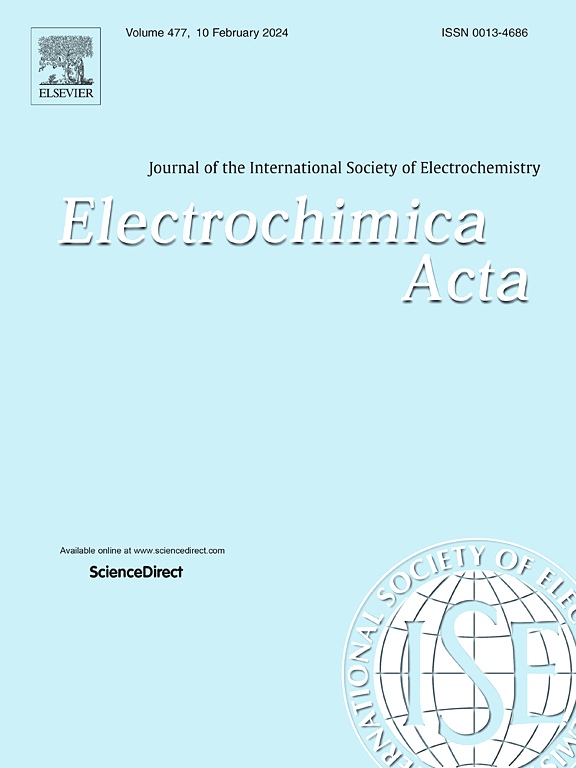用于微生物燃料电池碳纱阳极的生物催化剂:前驱体和催化剂负载对整体性能的影响
IF 5.5
3区 材料科学
Q1 ELECTROCHEMISTRY
引用次数: 0
摘要
阳极中的生物催化剂对于提高微生物燃料电池(MFC)的性能至关重要。从椰子木锯末(SD-B)和胡椒加工残渣(PS-B)等生物质中提取的生物催化剂被用来改善碳膜(CV)电极的电催化性能。研究发现,具有介孔结构的无定形石墨碳生物催化剂的比表面积为:SD-B 889.31 m2/g,PS-B 763.56 m2/g。研究发现,这两种催化剂中都含有表面官能团,如具有亲水性的 -OH 和促进细菌相容性的 -C=O 和 COOH。催化剂的负载量起着重要作用,当最佳负载量为 2 mg/cm2 时,两种生物催化剂的电极都表现出最大的电催化活性。SD-B 和 PS-B 修饰电极的伏安电容分别为 191.6 mF/cm2 和 106.6 mF/cm2,这也证明了它们的假电容行为。使用 SD-B 的 MFC 性能显示,最大功率密度为 10.1 W/m3(开路电压 (OCV) 为 850 mV),其次是 PS-B,为 6.89 W/m3(开路电压为 825 mV),而普通 CV 为 0.168 W/m3(开路电压为 760 mV)。阳极极化研究表明,生物催化剂改性阳极的斜率降低,表明电极动力学得到改善,尤其是在 SD-B 改良型 MFC 中,阴极成为限制电极。生物催化剂改性 MFC 的库仑效率从未修改 MFC 的 12.74% 分别提高到 54.50%(SD-B 2 mg/cm2)和 37.78%(PS-B 2 mg/cm2)。这项研究强调了生物催化剂作为一种简单、低成本的方法来增强阳极特性--多孔性、导电性、亲水性和生物相容性--的潜力。本文章由计算机程序翻译,如有差异,请以英文原文为准。
Biocatalyst for carbon veil anode in microbial fuel cells: The effect of precursor and catalyst loading on overall performance
Biocatalysts in anodes have been crucial in improving microbial fuel cell (MFC) performance. Biocatalysts derived from biomass such as coconut wood sawdust (SD-B) and pepper processing residue (PS-B), were used to improve the electrocatalytic properties of Carbon Veil (CV) electrodes. The amorphous graphitic carbon biocatalyst with a mesoporous structure was found to have a surface area of 889.31 m2/g for SD-B and 763.56 m2/g for PS-B. Surface functional groups such as -OH which imparts hydrophilicity and -C=O and COOH which promotes bacterial compatibility have been revealed to be present in both catalysts. Catalyst loading played a major role and at an optimal loading of 2 mg/cm2, the electrodes exhibited maximum electrocatalytic activity in the case of both biocatalysts. The voltammetric capacitances of SD-B and PS-B modified electrodes were 191.6 mF/cm2 and 106.6 mF/cm2 demonstrating their pseudocapacitive behaviour too. The performance of MFC with SD-B revealed a maximum power density of 10.1 W/m3 (Open Circuit Voltage (OCV) of 850 mV), followed by PS-B at 6.89 W/m3 (OCV of 825 mV) whereas the plain CV was at 0.168 W/m3 (OCV of 760 mV). Anode polarization studies indicated reduced slopes for biocatalyst-modified anodes, signifying improved electrode kinetics, particularly notable in the SD-B modified MFC where the cathode became the limiting electrode. Coulombic efficiencies of the biocatalyst-modified MFCs increased to 54.50%, (SD-B 2 mg/cm2) and 37.78% (PS-B 2 mg/cm2) respectively from 12.74% as noticed in the case of unmodified MFC. This study emphasizes the potential of biocatalysts as a simple and low-cost means of enhancing the anode properties – porosity, conductivity, hydrophilicity, and biocompatibility.
求助全文
通过发布文献求助,成功后即可免费获取论文全文。
去求助
来源期刊

Electrochimica Acta
工程技术-电化学
CiteScore
11.30
自引率
6.10%
发文量
1634
审稿时长
41 days
期刊介绍:
Electrochimica Acta is an international journal. It is intended for the publication of both original work and reviews in the field of electrochemistry. Electrochemistry should be interpreted to mean any of the research fields covered by the Divisions of the International Society of Electrochemistry listed below, as well as emerging scientific domains covered by ISE New Topics Committee.
 求助内容:
求助内容: 应助结果提醒方式:
应助结果提醒方式:


